第7章 多形性
“对于面向对象的程序设计语言,多型性是第三种最基本的特征(前两种是数据抽象和继承。”
“多形性”(Polymorphism)从另一个角度将接口从具体的实施细节中分离出来,亦即实现了“是什么”与“怎样做”两个模块的分离。利用多形性的概念,代码的组织以及可读性均能获得改善。此外,还能创建“易于扩展”的程序。无论在项目的创建过程中,还是在需要加入新特性的时候,它们都可以方便地“成长”。
通过合并各种特征与行为,封装技术可创建出新的数据类型。通过对具体实施细节的隐藏,可将接口与实施细节分离,使所有细节成为“private”(私有)。这种组织方式使那些有程序化编程背景人感觉颇为舒适。但多形性却涉及对“类型”的分解。通过上一章的学习,大家已知道通过继承可将一个对象当作它自己的类型或者它自己的基础类型对待。这种能力是十分重要的,因为多个类型(从相同的基础类型中衍生出来)可被当作同一种类型对待。而且只需一段代码,即可对所有不同的类型进行同样的处理。利用具有多形性的方法调用,一种类型可将自己与另一种相似的类型区分开,只要它们都是从相同的基础类型中衍生出来的。这种区分是通过各种方法在行为上的差异实现的,可通过基础类实现对那些方法的调用。
在这一章中,大家要由浅入深地学习有关多形性的问题(也叫作动态绑定、推迟绑定或者运行期绑定)。同时举一些简单的例子,其中所有无关的部分都已剥除,只保留与多形性有关的代码。
7.1 上溯造型
在第6章,大家已知道可将一个对象作为它自己的类型使用,或者作为它的基础类型的一个对象使用。取得一个对象句柄,并将其作为基础类型句柄使用的行为就叫作“上溯造型”——因为继承树的画法是基础类位于最上方。
但这样做也会遇到一个问题,如下例所示(若执行这个程序遇到麻烦,请参考第3章的3.1.2小节“赋值”):
//: Music.java
// Inheritance & upcasting
package c07;
class Note {
private int value;
private Note(int val) { value = val; }
public static final Note
middleC = new Note(0),
cSharp = new Note(1),
cFlat = new Note(2);
} // Etc.
class Instrument {
public void play(Note n) {
System.out.println("Instrument.play()");
}
}
// Wind objects are instruments
// because they have the same interface:
class Wind extends Instrument {
// Redefine interface method:
public void play(Note n) {
System.out.println("Wind.play()");
}
}
public class Music {
public static void tune(Instrument i) {
// ...
i.play(Note.middleC);
}
public static void main(String[] args) {
Wind flute = new Wind();
tune(flute); // Upcasting
}
} ///:~//: Music2.java
// Overloading instead of upcasting
class Note2 {
private int value;
private Note2(int val) { value = val; }
public static final Note2
middleC = new Note2(0),
cSharp = new Note2(1),
cFlat = new Note2(2);
} // Etc.
class Instrument2 {
public void play(Note2 n) {
System.out.println("Instrument2.play()");
}
}
class Wind2 extends Instrument2 {
public void play(Note2 n) {
System.out.println("Wind2.play()");
}
}
class Stringed2 extends Instrument2 {
public void play(Note2 n) {
System.out.println("Stringed2.play()");
}
}
class Brass2 extends Instrument2 {
public void play(Note2 n) {
System.out.println("Brass2.play()");
}
}
public class Music2 {
public static void tune(Wind2 i) {
i.play(Note2.middleC);
}
public static void tune(Stringed2 i) {
i.play(Note2.middleC);
}
public static void tune(Brass2 i) {
i.play(Note2.middleC);
}
public static void main(String[] args) {
Wind2 flute = new Wind2();
Stringed2 violin = new Stringed2();
Brass2 frenchHorn = new Brass2();
tune(flute); // No upcasting
tune(violin);
tune(frenchHorn);
}
} ///:~
//: Shapes.java
// Polymorphism in Java
class Shape {
void draw() {}
void erase() {}
}
class Circle extends Shape {
void draw() {
System.out.println("Circle.draw()");
}
void erase() {
System.out.println("Circle.erase()");
}
}
class Square extends Shape {
void draw() {
System.out.println("Square.draw()");
}
void erase() {
System.out.println("Square.erase()");
}
}
class Triangle extends Shape {
void draw() {
System.out.println("Triangle.draw()");
}
void erase() {
System.out.println("Triangle.erase()");
}
}
public class Shapes {
public static Shape randShape() {
switch((int)(Math.random() * 3)) {
default: // To quiet the compiler
case 0: return new Circle();
case 1: return new Square();
case 2: return new Triangle();
}
}
public static void main(String[] args) {
Shape[] s = new Shape[9];
// Fill up the array with shapes:
for(int i = 0; i < s.length; i++)
s[i] = randShape();
// Make polymorphic method calls:
for(int i = 0; i < s.length; i++)
s[i].draw();
}
} ///:~Circle.draw() Triangle.draw() Circle.draw() Circle.draw() Circle.draw() Square.draw() Triangle.draw() Square.draw() Square.draw()

//: Music3.java
// An extensible program
import java.util.*;
class Instrument3 {
public void play() {
System.out.println("Instrument3.play()");
}
public String what() {
return "Instrument3";
}
public void adjust() {}
}
class Wind3 extends Instrument3 {
public void play() {
System.out.println("Wind3.play()");
}
public String what() { return "Wind3"; }
public void adjust() {}
}
class Percussion3 extends Instrument3 {
public void play() {
System.out.println("Percussion3.play()");
}
public String what() { return "Percussion3"; }
public void adjust() {}
}
class Stringed3 extends Instrument3 {
public void play() {
System.out.println("Stringed3.play()");
}
public String what() { return "Stringed3"; }
public void adjust() {}
}
class Brass3 extends Wind3 {
public void play() {
System.out.println("Brass3.play()");
}
public void adjust() {
System.out.println("Brass3.adjust()");
}
}
class Woodwind3 extends Wind3 {
public void play() {
System.out.println("Woodwind3.play()");
}
public String what() { return "Woodwind3"; }
}
public class Music3 {
// Doesn't care about type, so new types
// added to the system still work right:
static void tune(Instrument3 i) {
// ...
i.play();
}
static void tuneAll(Instrument3[] e) {
for(int i = 0; i < e.length; i++)
tune(e[i]);
}
public static void main(String[] args) {
Instrument3[] orchestra = new Instrument3[5];
int i = 0;
// Upcasting during addition to the array:
orchestra[i++] = new Wind3();
orchestra[i++] = new Percussion3();
orchestra[i++] = new Stringed3();
orchestra[i++] = new Brass3();
orchestra[i++] = new Woodwind3();
tuneAll(orchestra);
}
} ///:~//: WindError.java
// Accidentally changing the interface
class NoteX {
public static final int
MIDDLE_C = 0, C_SHARP = 1, C_FLAT = 2;
}
class InstrumentX {
public void play(int NoteX) {
System.out.println("InstrumentX.play()");
}
}
class WindX extends InstrumentX {
// OOPS! Changes the method interface:
public void play(NoteX n) {
System.out.println("WindX.play(NoteX n)");
}
}
public class WindError {
public static void tune(InstrumentX i) {
// ...
i.play(NoteX.MIDDLE_C);
}
public static void main(String[] args) {
WindX flute = new WindX();
tune(flute); // Not the desired behavior!
}
} ///:~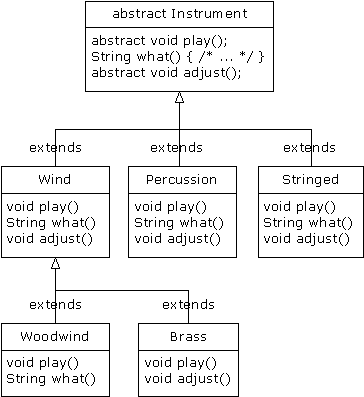
//: Music4.java
// Abstract classes and methods
import java.util.*;
abstract class Instrument4 {
int i; // storage allocated for each
public abstract void play();
public String what() {
return "Instrument4";
}
public abstract void adjust();
}
class Wind4 extends Instrument4 {
public void play() {
System.out.println("Wind4.play()");
}
public String what() { return "Wind4"; }
public void adjust() {}
}
class Percussion4 extends Instrument4 {
public void play() {
System.out.println("Percussion4.play()");
}
public String what() { return "Percussion4"; }
public void adjust() {}
}
class Stringed4 extends Instrument4 {
public void play() {
System.out.println("Stringed4.play()");
}
public String what() { return "Stringed4"; }
public void adjust() {}
}
class Brass4 extends Wind4 {
public void play() {
System.out.println("Brass4.play()");
}
public void adjust() {
System.out.println("Brass4.adjust()");
}
}
class Woodwind4 extends Wind4 {
public void play() {
System.out.println("Woodwind4.play()");
}
public String what() { return "Woodwind4"; }
}
public class Music4 {
// Doesn't care about type, so new types
// added to the system still work right:
static void tune(Instrument4 i) {
// ...
i.play();
}
static void tuneAll(Instrument4[] e) {
for(int i = 0; i < e.length; i++)
tune(e[i]);
}
public static void main(String[] args) {
Instrument4[] orchestra = new Instrument4[5];
int i = 0;
// Upcasting during addition to the array:
orchestra[i++] = new Wind4();
orchestra[i++] = new Percussion4();
orchestra[i++] = new Stringed4();
orchestra[i++] = new Brass4();
orchestra[i++] = new Woodwind4();
tuneAll(orchestra);
}
} ///:~
//: Music5.java
// Interfaces
import java.util.*;
interface Instrument5 {
// Compile-time constant:
int i = 5; // static & final
// Cannot have method definitions:
void play(); // Automatically public
String what();
void adjust();
}
class Wind5 implements Instrument5 {
public void play() {
System.out.println("Wind5.play()");
}
public String what() { return "Wind5"; }
public void adjust() {}
}
class Percussion5 implements Instrument5 {
public void play() {
System.out.println("Percussion5.play()");
}
public String what() { return "Percussion5"; }
public void adjust() {}
}
class Stringed5 implements Instrument5 {
public void play() {
System.out.println("Stringed5.play()");
}
public String what() { return "Stringed5"; }
public void adjust() {}
}
class Brass5 extends Wind5 {
public void play() {
System.out.println("Brass5.play()");
}
public void adjust() {
System.out.println("Brass5.adjust()");
}
}
class Woodwind5 extends Wind5 {
public void play() {
System.out.println("Woodwind5.play()");
}
public String what() { return "Woodwind5"; }
}
public class Music5 {
// Doesn't care about type, so new types
// added to the system still work right:
static void tune(Instrument5 i) {
// ...
i.play();
}
static void tuneAll(Instrument5[] e) {
for(int i = 0; i < e.length; i++)
tune(e[i]);
}
public static void main(String[] args) {
Instrument5[] orchestra = new Instrument5[5];
int i = 0;
// Upcasting during addition to the array:
orchestra[i++] = new Wind5();
orchestra[i++] = new Percussion5();
orchestra[i++] = new Stringed5();
orchestra[i++] = new Brass5();
orchestra[i++] = new Woodwind5();
tuneAll(orchestra);
}
} ///:~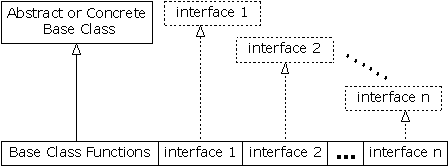
//: Adventure.java
// Multiple interfaces
import java.util.*;
interface CanFight {
void fight();
}
interface CanSwim {
void swim();
}
interface CanFly {
void fly();
}
class ActionCharacter {
public void fight() {}
}
class Hero extends ActionCharacter
implements CanFight, CanSwim, CanFly {
public void swim() {}
public void fly() {}
}
public class Adventure {
static void t(CanFight x) { x.fight(); }
static void u(CanSwim x) { x.swim(); }
static void v(CanFly x) { x.fly(); }
static void w(ActionCharacter x) { x.fight(); }
public static void main(String[] args) {
Hero i = new Hero();
t(i); // Treat it as a CanFight
u(i); // Treat it as a CanSwim
v(i); // Treat it as a CanFly
w(i); // Treat it as an ActionCharacter
}
} ///:~//: HorrorShow.java
// Extending an interface with inheritance
interface Monster {
void menace();
}
interface DangerousMonster extends Monster {
void destroy();
}
interface Lethal {
void kill();
}
class DragonZilla implements DangerousMonster {
public void menace() {}
public void destroy() {}
}
interface Vampire
extends DangerousMonster, Lethal {
void drinkBlood();
}
class HorrorShow {
static void u(Monster b) { b.menace(); }
static void v(DangerousMonster d) {
d.menace();
d.destroy();
}
public static void main(String[] args) {
DragonZilla if2 = new DragonZilla();
u(if2);
v(if2);
}
} ///:~//: Months.java
// Using interfaces to create groups of constants
package c07;
public interface Months {
int
JANUARY = 1, FEBRUARY = 2, MARCH = 3,
APRIL = 4, MAY = 5, JUNE = 6, JULY = 7,
AUGUST = 8, SEPTEMBER = 9, OCTOBER = 10,
NOVEMBER = 11, DECEMBER = 12;
} ///:~//: Month2.java
// A more robust enumeration system
package c07;
public final class Month2 {
private String name;
private Month2(String nm) { name = nm; }
public String toString() { return name; }
public final static Month2
JAN = new Month2("January"),
FEB = new Month2("February"),
MAR = new Month2("March"),
APR = new Month2("April"),
MAY = new Month2("May"),
JUN = new Month2("June"),
JUL = new Month2("July"),
AUG = new Month2("August"),
SEP = new Month2("September"),
OCT = new Month2("October"),
NOV = new Month2("November"),
DEC = new Month2("December");
public final static Month2[] month = {
JAN, JAN, FEB, MAR, APR, MAY, JUN,
JUL, AUG, SEP, OCT, NOV, DEC
};
public static void main(String[] args) {
Month2 m = Month2.JAN;
System.out.println(m);
m = Month2.month[12];
System.out.println(m);
System.out.println(m == Month2.DEC);
System.out.println(m.equals(Month2.DEC));
}
} ///:~//: RandVals.java
// Initializing interface fields with
// non-constant initializers
import java.util.*;
public interface RandVals {
int rint = (int)(Math.random() * 10);
long rlong = (long)(Math.random() * 10);
float rfloat = (float)(Math.random() * 10);
double rdouble = Math.random() * 10;
} ///:~//: TestRandVals.java
public class TestRandVals {
public static void main(String[] args) {
System.out.println(RandVals.rint);
System.out.println(RandVals.rlong);
System.out.println(RandVals.rfloat);
System.out.println(RandVals.rdouble);
}
} ///:~//: Parcel1.java
// Creating inner classes
package c07.parcel1;
public class Parcel1 {
class Contents {
private int i = 11;
public int value() { return i; }
}
class Destination {
private String label;
Destination(String whereTo) {
label = whereTo;
}
String readLabel() { return label; }
}
// Using inner classes looks just like
// using any other class, within Parcel1:
public void ship(String dest) {
Contents c = new Contents();
Destination d = new Destination(dest);
}
public static void main(String[] args) {
Parcel1 p = new Parcel1();
p.ship("Tanzania");
}
} ///:~//: Parcel2.java
// Returning a handle to an inner class
package c07.parcel2;
public class Parcel2 {
class Contents {
private int i = 11;
public int value() { return i; }
}
class Destination {
private String label;
Destination(String whereTo) {
label = whereTo;
}
String readLabel() { return label; }
}
public Destination to(String s) {
return new Destination(s);
}
public Contents cont() {
return new Contents();
}
public void ship(String dest) {
Contents c = cont();
Destination d = to(dest);
}
public static void main(String[] args) {
Parcel2 p = new Parcel2();
p.ship("Tanzania");
Parcel2 q = new Parcel2();
// Defining handles to inner classes:
Parcel2.Contents c = q.cont();
Parcel2.Destination d = q.to("Borneo");
}
} ///:~//: Parcel3.java
// Returning a handle to an inner class
package c07.parcel3;
abstract class Contents {
abstract public int value();
}
interface Destination {
String readLabel();
}
public class Parcel3 {
private class PContents extends Contents {
private int i = 11;
public int value() { return i; }
}
protected class PDestination
implements Destination {
private String label;
private PDestination(String whereTo) {
label = whereTo;
}
public String readLabel() { return label; }
}
public Destination dest(String s) {
return new PDestination(s);
}
public Contents cont() {
return new PContents();
}
}
class Test {
public static void main(String[] args) {
Parcel3 p = new Parcel3();
Contents c = p.cont();
Destination d = p.dest("Tanzania");
// Illegal -- can't access private class:
//! Parcel3.PContents c = p.new PContents();
}
} ///:~//: Destination.java
package c07.innerscopes;
interface Destination {
String readLabel();
} ///:~//: Contents.java
package c07.innerscopes;
interface Contents {
int value();
} ///:~//: Wrapping.java
package c07.innerscopes;
public class Wrapping {
private int i;
public Wrapping(int x) { i = x; }
public int value() { return i; }
} ///:~//: Parcel4.java
// Nesting a class within a method
package c07.innerscopes;
public class Parcel4 {
public Destination dest(String s) {
class PDestination
implements Destination {
private String label;
private PDestination(String whereTo) {
label = whereTo;
}
public String readLabel() { return label; }
}
return new PDestination(s);
}
public static void main(String[] args) {
Parcel4 p = new Parcel4();
Destination d = p.dest("Tanzania");
}
} ///:~//: Parcel5.java
// Nesting a class within a scope
package c07.innerscopes;
public class Parcel5 {
private void internalTracking(boolean b) {
if(b) {
class TrackingSlip {
private String id;
TrackingSlip(String s) {
id = s;
}
String getSlip() { return id; }
}
TrackingSlip ts = new TrackingSlip("slip");
String s = ts.getSlip();
}
// Can't use it here! Out of scope:
//! TrackingSlip ts = new TrackingSlip("x");
}
public void track() { internalTracking(true); }
public static void main(String[] args) {
Parcel5 p = new Parcel5();
p.track();
}
} ///:~//: Parcel6.java
// A method that returns an anonymous inner class
package c07.innerscopes;
public class Parcel6 {
public Contents cont() {
return new Contents() {
private int i = 11;
public int value() { return i; }
}; // Semicolon required in this case
}
public static void main(String[] args) {
Parcel6 p = new Parcel6();
Contents c = p.cont();
}
} ///:~//: Parcel7.java
// An anonymous inner class that calls the
// base-class constructor
package c07.innerscopes;
public class Parcel7 {
public Wrapping wrap(int x) {
// Base constructor call:
return new Wrapping(x) {
public int value() {
return super.value() * 47;
}
}; // Semicolon required
}
public static void main(String[] args) {
Parcel7 p = new Parcel7();
Wrapping w = p.wrap(10);
}
} ///:~//: Parcel8.java
// An anonymous inner class that performs
// initialization. A briefer version
// of Parcel5.java.
package c07.innerscopes;
public class Parcel8 {
// Argument must be final to use inside
// anonymous inner class:
public Destination dest(final String dest) {
return new Destination() {
private String label = dest;
public String readLabel() { return label; }
};
}
public static void main(String[] args) {
Parcel8 p = new Parcel8();
Destination d = p.dest("Tanzania");
}
} ///:~//: Parcel9.java
// Using "instance initialization" to perform
// construction on an anonymous inner class
package c07.innerscopes;
public class Parcel9 {
public Destination
dest(final String dest, final float price) {
return new Destination() {
private int cost;
// Instance initialization for each object:
{
cost = Math.round(price);
if(cost > 100)
System.out.println("Over budget!");
}
private String label = dest;
public String readLabel() { return label; }
};
}
public static void main(String[] args) {
Parcel9 p = new Parcel9();
Destination d = p.dest("Tanzania", 101.395F);
}
} ///:~//: Sequence.java
// Holds a sequence of Objects
interface Selector {
boolean end();
Object current();
void next();
}
public class Sequence {
private Object[] o;
private int next = 0;
public Sequence(int size) {
o = new Object[size];
}
public void add(Object x) {
if(next < o.length) {
o[next] = x;
next++;
}
}
private class SSelector implements Selector {
int i = 0;
public boolean end() {
return i == o.length;
}
public Object current() {
return o[i];
}
public void next() {
if(i < o.length) i++;
}
}
public Selector getSelector() {
return new SSelector();
}
public static void main(String[] args) {
Sequence s = new Sequence(10);
for(int i = 0; i < 10; i++)
s.add(Integer.toString(i));
Selector sl = s.getSelector();
while(!sl.end()) {
System.out.println((String)sl.current());
sl.next();
}
}
} ///:~//: Parcel10.java
// Static inner classes
package c07.parcel10;
abstract class Contents {
abstract public int value();
}
interface Destination {
String readLabel();
}
public class Parcel10 {
private static class PContents
extends Contents {
private int i = 11;
public int value() { return i; }
}
protected static class PDestination
implements Destination {
private String label;
private PDestination(String whereTo) {
label = whereTo;
}
public String readLabel() { return label; }
}
public static Destination dest(String s) {
return new PDestination(s);
}
public static Contents cont() {
return new PContents();
}
public static void main(String[] args) {
Contents c = cont();
Destination d = dest("Tanzania");
}
} ///:~//: IInterface.java
// Static inner classes inside interfaces
interface IInterface {
static class Inner {
int i, j, k;
public Inner() {}
void f() {}
}
} ///:~//: TestBed.java
// Putting test code in a static inner class
class TestBed {
TestBed() {}
void f() { System.out.println("f()"); }
public static class Tester {
public static void main(String[] args) {
TestBed t = new TestBed();
t.f();
}
}
} ///:~//: Parcel11.java
// Creating inner classes
package c07.parcel11;
public class Parcel11 {
class Contents {
private int i = 11;
public int value() { return i; }
}
class Destination {
private String label;
Destination(String whereTo) {
label = whereTo;
}
String readLabel() { return label; }
}
public static void main(String[] args) {
Parcel11 p = new Parcel11();
// Must use instance of outer class
// to create an instances of the inner class:
Parcel11.Contents c = p.new Contents();
Parcel11.Destination d =
p.new Destination("Tanzania");
}
} ///:~//: InheritInner.java
// Inheriting an inner class
class WithInner {
class Inner {}
}
public class InheritInner
extends WithInner.Inner {
//! InheritInner() {} // Won't compile
InheritInner(WithInner wi) {
wi.super();
}
public static void main(String[] args) {
WithInner wi = new WithInner();
InheritInner ii = new InheritInner(wi);
}
} ///:~//: BigEgg.java
// An inner class cannot be overriden
// like a method
class Egg {
protected class Yolk {
public Yolk() {
System.out.println("Egg.Yolk()");
}
}
private Yolk y;
public Egg() {
System.out.println("New Egg()");
y = new Yolk();
}
}
public class BigEgg extends Egg {
public class Yolk {
public Yolk() {
System.out.println("BigEgg.Yolk()");
}
}
public static void main(String[] args) {
new BigEgg();
}
} ///:~//: BigEgg2.java
// Proper inheritance of an inner class
class Egg2 {
protected class Yolk {
public Yolk() {
System.out.println("Egg2.Yolk()");
}
public void f() {
System.out.println("Egg2.Yolk.f()");
}
}
private Yolk y = new Yolk();
public Egg2() {
System.out.println("New Egg2()");
}
public void insertYolk(Yolk yy) { y = yy; }
public void g() { y.f(); }
}
public class BigEgg2 extends Egg2 {
public class Yolk extends Egg2.Yolk {
public Yolk() {
System.out.println("BigEgg2.Yolk()");
}
public void f() {
System.out.println("BigEgg2.Yolk.f()");
}
}
public BigEgg2() { insertYolk(new Yolk()); }
public static void main(String[] args) {
Egg2 e2 = new BigEgg2();
e2.g();
}
} ///:~//: Event.java
// The common methods for any control event
package c07.controller;
abstract public class Event {
private long evtTime;
public Event(long eventTime) {
evtTime = eventTime;
}
public boolean ready() {
return System.currentTimeMillis() >= evtTime;
}
abstract public void action();
abstract public String description();
} ///:~//: Controller.java
// Along with Event, the generic
// framework for all control systems:
package c07.controller;
// This is just a way to hold Event objects.
class EventSet {
private Event[] events = new Event[100];
private int index = 0;
private int next = 0;
public void add(Event e) {
if(index >= events.length)
return; // (In real life, throw exception)
events[index++] = e;
}
public Event getNext() {
boolean looped = false;
int start = next;
do {
next = (next + 1) % events.length;
// See if it has looped to the beginning:
if(start == next) looped = true;
// If it loops past start, the list
// is empty:
if((next == (start + 1) % events.length)
&& looped)
return null;
} while(events[next] == null);
return events[next];
}
public void removeCurrent() {
events[next] = null;
}
}
public class Controller {
private EventSet es = new EventSet();
public void addEvent(Event c) { es.add(c); }
public void run() {
Event e;
while((e = es.getNext()) != null) {
if(e.ready()) {
e.action();
System.out.println(e.description());
es.removeCurrent();
}
}
}
} ///:~//: GreenhouseControls.java
// This produces a specific application of the
// control system, all in a single class. Inner
// classes allow you to encapsulate different
// functionality for each type of event.
package c07.controller;
public class GreenhouseControls
extends Controller {
private boolean light = false;
private boolean water = false;
private String thermostat = "Day";
private class LightOn extends Event {
public LightOn(long eventTime) {
super(eventTime);
}
public void action() {
// Put hardware control code here to
// physically turn on the light.
light = true;
}
public String description() {
return "Light is on";
}
}
private class LightOff extends Event {
public LightOff(long eventTime) {
super(eventTime);
}
public void action() {
// Put hardware control code here to
// physically turn off the light.
light = false;
}
public String description() {
return "Light is off";
}
}
private class WaterOn extends Event {
public WaterOn(long eventTime) {
super(eventTime);
}
public void action() {
// Put hardware control code here
water = true;
}
public String description() {
return "Greenhouse water is on";
}
}
private class WaterOff extends Event {
public WaterOff(long eventTime) {
super(eventTime);
}
public void action() {
// Put hardware control code here
water = false;
}
public String description() {
return "Greenhouse water is off";
}
}
private class ThermostatNight extends Event {
public ThermostatNight(long eventTime) {
super(eventTime);
}
public void action() {
// Put hardware control code here
thermostat = "Night";
}
public String description() {
return "Thermostat on night setting";
}
}
private class ThermostatDay extends Event {
public ThermostatDay(long eventTime) {
super(eventTime);
}
public void action() {
// Put hardware control code here
thermostat = "Day";
}
public String description() {
return "Thermostat on day setting";
}
}
// An example of an action() that inserts a
// new one of itself into the event list:
private int rings;
private class Bell extends Event {
public Bell(long eventTime) {
super(eventTime);
}
public void action() {
// Ring bell every 2 seconds, rings times:
System.out.println("Bing!");
if(--rings > 0)
addEvent(new Bell(
System.currentTimeMillis() + 2000));
}
public String description() {
return "Ring bell";
}
}
private class Restart extends Event {
public Restart(long eventTime) {
super(eventTime);
}
public void action() {
long tm = System.currentTimeMillis();
// Instead of hard-wiring, you could parse
// configuration information from a text
// file here:
rings = 5;
addEvent(new ThermostatNight(tm));
addEvent(new LightOn(tm + 1000));
addEvent(new LightOff(tm + 2000));
addEvent(new WaterOn(tm + 3000));
addEvent(new WaterOff(tm + 8000));
addEvent(new Bell(tm + 9000));
addEvent(new ThermostatDay(tm + 10000));
// Can even add a Restart object!
addEvent(new Restart(tm + 20000));
}
public String description() {
return "Restarting system";
}
}
public static void main(String[] args) {
GreenhouseControls gc =
new GreenhouseControls();
long tm = System.currentTimeMillis();
gc.addEvent(gc.new Restart(tm));
gc.run();
}
} ///:~//: Sandwich.java
// Order of constructor calls
class Meal {
Meal() { System.out.println("Meal()"); }
}
class Bread {
Bread() { System.out.println("Bread()"); }
}
class Cheese {
Cheese() { System.out.println("Cheese()"); }
}
class Lettuce {
Lettuce() { System.out.println("Lettuce()"); }
}
class Lunch extends Meal {
Lunch() { System.out.println("Lunch()");}
}
class PortableLunch extends Lunch {
PortableLunch() {
System.out.println("PortableLunch()");
}
}
class Sandwich extends PortableLunch {
Bread b = new Bread();
Cheese c = new Cheese();
Lettuce l = new Lettuce();
Sandwich() {
System.out.println("Sandwich()");
}
public static void main(String[] args) {
new Sandwich();
}
} ///:~Meal() Lunch() PortableLunch() Bread() Cheese() Lettuce() Sandwich()
//: Frog.java
// Testing finalize with inheritance
class DoBaseFinalization {
public static boolean flag = false;
}
class Characteristic {
String s;
Characteristic(String c) {
s = c;
System.out.println(
"Creating Characteristic " + s);
}
protected void finalize() {
System.out.println(
"finalizing Characteristic " + s);
}
}
class LivingCreature {
Characteristic p =
new Characteristic("is alive");
LivingCreature() {
System.out.println("LivingCreature()");
}
protected void finalize() {
System.out.println(
"LivingCreature finalize");
// Call base-class version LAST!
if(DoBaseFinalization.flag)
try {
super.finalize();
} catch(Throwable t) {}
}
}
class Animal extends LivingCreature {
Characteristic p =
new Characteristic("has heart");
Animal() {
System.out.println("Animal()");
}
protected void finalize() {
System.out.println("Animal finalize");
if(DoBaseFinalization.flag)
try {
super.finalize();
} catch(Throwable t) {}
}
}
class Amphibian extends Animal {
Characteristic p =
new Characteristic("can live in water");
Amphibian() {
System.out.println("Amphibian()");
}
protected void finalize() {
System.out.println("Amphibian finalize");
if(DoBaseFinalization.flag)
try {
super.finalize();
} catch(Throwable t) {}
}
}
public class Frog extends Amphibian {
Frog() {
System.out.println("Frog()");
}
protected void finalize() {
System.out.println("Frog finalize");
if(DoBaseFinalization.flag)
try {
super.finalize();
} catch(Throwable t) {}
}
public static void main(String[] args) {
if(args.length != 0 &&
args[0].equals("finalize"))
DoBaseFinalization.flag = true;
else
System.out.println("not finalizing bases");
new Frog(); // Instantly becomes garbage
System.out.println("bye!");
// Must do this to guarantee that all
// finalizers will be called:
System.runFinalizersOnExit(true);
}
} ///:~not finalizing bases Creating Characteristic is alive LivingCreature() Creating Characteristic has heart Animal() Creating Characteristic can live in water Amphibian() Frog() bye! Frog finalize finalizing Characteristic is alive finalizing Characteristic has heart finalizing Characteristic can live in water
Creating Characteristic is alive LivingCreature() Creating Characteristic has heart Animal() Creating Characteristic can live in water Amphibian() Frog() bye! Frog finalize Amphibian finalize Animal finalize LivingCreature finalize finalizing Characteristic is alive finalizing Characteristic has heart finalizing Characteristic can live in water
//: PolyConstructors.java
// Constructors and polymorphism
// don't produce what you might expect.
abstract class Glyph {
abstract void draw();
Glyph() {
System.out.println("Glyph() before draw()");
draw();
System.out.println("Glyph() after draw()");
}
}
class RoundGlyph extends Glyph {
int radius = 1;
RoundGlyph(int r) {
radius = r;
System.out.println(
"RoundGlyph.RoundGlyph(), radius = "
+ radius);
}
void draw() {
System.out.println(
"RoundGlyph.draw(), radius = " + radius);
}
}
public class PolyConstructors {
public static void main(String[] args) {
new RoundGlyph(5);
}
} ///:~Glyph() before draw() RoundGlyph.draw(), radius = 0 Glyph() after draw() RoundGlyph.RoundGlyph(), radius = 5
//: Transmogrify.java
// Dynamically changing the behavior of
// an object via composition.
interface Actor {
void act();
}
class HappyActor implements Actor {
public void act() {
System.out.println("HappyActor");
}
}
class SadActor implements Actor {
public void act() {
System.out.println("SadActor");
}
}
class Stage {
Actor a = new HappyActor();
void change() { a = new SadActor(); }
void go() { a.act(); }
}
public class Transmogrify {
public static void main(String[] args) {
Stage s = new Stage();
s.go(); // Prints "HappyActor"
s.change();
s.go(); // Prints "SadActor"
}
} ///:~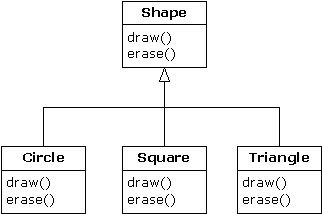

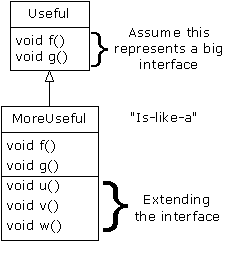

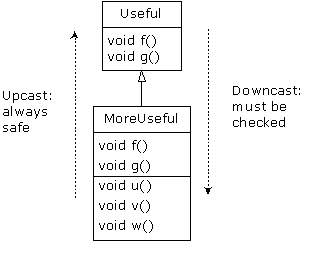
//: RTTI.java
// Downcasting & Run-Time Type
// Identification (RTTI)
import java.util.*;
class Useful {
public void f() {}
public void g() {}
}
class MoreUseful extends Useful {
public void f() {}
public void g() {}
public void u() {}
public void v() {}
public void w() {}
}
public class RTTI {
public static void main(String[] args) {
Useful[] x = {
new Useful(),
new MoreUseful()
};
x[0].f();
x[1].g();
// Compile-time: method not found in Useful:
//! x[1].u();
((MoreUseful)x[1]).u(); // Downcast/RTTI
((MoreUseful)x[0]).u(); // Exception thrown
}
} ///:~![]()